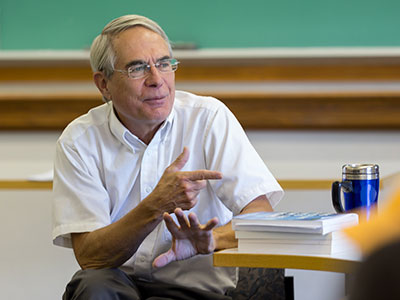Should parents be free to “enhance” their children by choosing their genetic traits—their height, their eye color, their cognitive ability, for example?” Questions such as these led Pittsburgh Seminary professor the Rev. Dr. Ron Cole-Turner to organize a high-level mini-conference for the upcoming American Academy of Religion’s annual meetings in Boston. The panelists will address the real-world debate concerning ethical issues involved in the newest gene-editing technology, CRISPR/Cas, which enables scientists to modify DNA in human embryos.
“So far these DNA-modified embryos have been intentionally non-viable so they won’t develop. But this science is so significant that the likelihood of its use has led the world’s top scientific organizations to come together to discuss the ethical issues involved,” Ron notes. These organizations include the National Academy of Sciences, the National Academy of Medicine, and the Royal Society of London, with the cooperation also of the Chinese Academy of Science, which has been in the forefront of developing this technology. Ron pulled together the AAR event on behalf of the Cambridge (UK)-based International Society for Science and Religion, of which he is vice president.
Why is this new technology so significant not only for science but also for people of faith? “CRISPR is far more powerful and precise than previous technologies in that it involves actual genetic modification, not just genetic selection,” Ron explains. “As the latest tool in the genetic-engineering toolkit, CRISPR could be used to prevent inherited diseases, perhaps even early onset Alzheimer’s or cancer. In that case, we might think of it as a ‘genetic vaccine.’ But from an ethical point of view, perspectives on CRISPR’s other possible uses are more open to question.
The implications of such questions for Christians become even more complicated for many who maintain that we should view children as gifts from God which come full of surprises, not as products to satisfy our preferences. “There’s something deeply Christian about being open to what God gives you in a child, and increasingly that perspective characterizes the conscience of Christians,” Ron observes. “Nevertheless, since we do tend not only to accept but actually to encourage (even expect) the shaping of our children both physically and cognitively through environmental factors—good nutrition, music lessons, academic tutoring, sports involvements, etc.—some people raise the question, ‘Why would it be wrong to shape our children through genetic modification?’”
“Real-life situations drive this debate,” notes Ron, “and many claim that, if we can reliably and safely employ germline modification for medically necessary and defensible reasons, what’s to keep us from using it for medically elective and speculative reasons in embryos intended for implantation?” Many other ethical issues surface in the current debate, of course. They include our ignorance of the long-term outcomes of germline modification in human beings and the decades-long existence of more medically conservative approaches to preventing diseases. “But even these more conservative approaches are not completely free from ethical concerns,” says Ron.
So where do we go from here? Does CRISPR go where we shouldn’t go? How will the Church answer such questions as, “To what extent is conceiving a child appropriately a venture in the great unknown?” and “To what extent are parents called by God to open themselves to receive the gift of a life that will surprise them?”
With the help of the National Academy of Sciences, Ron is hoping to arrange for a live video stream of the Boston mini-conference, where a myriad of questions—some like those above—will be discussed from a variety of perspectives. Heading the panel will be British biologist Richard Hynes of MIT’s Koch Institute for Integrative Cancer Research, along with sociologist John Evans (UCSD), bioethicist Laurie Zoloth (dean of the University of Chicago Divinity School), and Ron himself (PTS’s H. Parker Sharp Professor of Theology and Ethics). “Research on CRISPR is a shoe-in eventually for a Nobel Prize,” says Ron. “I encourage all Christians to follow the debate and participate in the discussion.”

